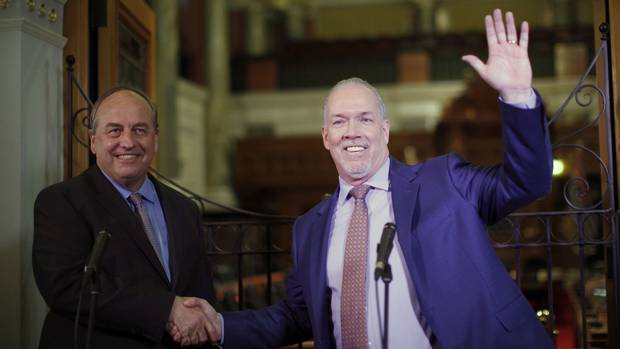In British Columbia politics, political scientist Norman Ruff says he has seen it all in 49 years of living in Canada's most westerly province. Then came Monday.
"This is – what's the word – epoch-making," Prof. Ruff said of news that the provincial Green Party had reached an agreement with the New Democrats to topple the BC Liberal government of Premier Christy Clark. The Greens have promised to support an NDP government in confidence votes.
The alliance caps weeks of talks since the May 9 election created the province's first minority-government situation in six decades. The deal means that, combined, the NDP and Greens would have a single-seat advantage over the Liberals.
"It could be the beginning of an entirely new state of party competition," said the professor emeritus at the University of Victoria. What comes next, he said, "depends on everyone's will for power. That's what's being tested here – to what extent are they prepared to pull out all the stops to either retain the premiership or attain the premiership."
Here are some of the next steps on that path.
Countdown
Convention says the Liberals, who won 43 of 87 legislature seats, would have to be defeated by the combined B.C. New Democrats and B.C. Greens in a vote in the legislature before power was turned over.
Ms. Clark has to recall the B.C. legislature by Sept. 30 to pass a budget because the Liberals have provisions only until then to cover government operating expenses.
"They only have enough supply – the right to spend money – until September, after which government is not authorized to spend, and I don't think we want to get into a government shutdown scenario," said Hamish Telford, a political scientist at the University of the Fraser Valley. Before that, the Liberals would have to bring in a throne speech covering policy direction. Either of these would be confidence motions.
Max Cameron, a political scientist at the University of British Columbia, said there is no formal rule on when a legislature should be brought back, but he expects this will happen within a month of the election, in early June.
Mr. Cameron said pressure to deal with the province's finances will likely force a quick resolution of the issue.
"There is an imperative to get to the bottom of this as quickly as possible. Uncertainty about who is going to form the government is not desirable. We don't want a vacuum in power. At this point, we have a sitting Premier and we have an agreement between two parties that represent a majority of the votes. That has to be resolved, and the sooner it's resolved, the better for everyone."
He said he expects the Greens and the NDP would defeat Ms. Clark "at the first possible opportunity."
That would bring another player into the situation.
The Lieutenant-Governor
Ms. Clark has said Judith Guichon, the B.C. Lieutenant-Governor, asked her after the election to continue to lead the government until all the ballots were counted.
That election has created the current situation: 43 Liberals, 41 New Democrats and three Greens in the 87-seat legislature.
"The bottom line is that it's the duty of the Lieutenant-Governor to ensure that there's a B.C. government that enjoys the majority of support in the legislature," Prof. Ruff said.
Mr. Horgan said he would go to Ms. Guichon in the "next number of days" to talk about his agreement, but Ms. Clark continues to be Premier and her party remains in government until it is defeated in the legislature.
The defeat would give Ms. Guichon various possible scenarios, including asking NDP Leader John Horgan to form a government.
According to a report in the Black Press chain of newspapers, Ms. Guichon – a rancher from the B.C. Interior appointed to her post in 2012 – told students in Abbotsford last week that it is "quite likely" Ms. Clark will attempt to win support for a throne speech in the legislature.
The report quoted Ms. Guichon as saying the throne speech could pass, but the budget thereafter "would be perhaps a more controversial aspect."
Maybe, Ms. Guichon said, "we'll have a new era where everybody will work together. … I, like the rest of you, will tune in to watch very closely."
Ms. Guichon has the option of asking Mr. Horgan and Mr. Weaver to govern without holding an election.

DARRYL DYCK/THE CANADIAN PRESS
The Speaker
At some point, MLAs will have to choose a speaker.
"They might get stuck on that very point," Prof. Telford said.
Things will be so tight in the legislature that the Greens and NDP may not want to give up a member to serve in that role. "I think that would be unprecedented."
Prof. Ruff said a Green or NDP speaker would cost them their majority in the legislature.
"It's extremely precarious," he said.
That said, a Liberal could be named speaker, but if no Liberal was willing to do so, the NDP would have to put up one of their members.
In a tie vote in the legislature, the speaker votes in favour of government.
Prof. Ruff said the whole situation is unprecedented.
"This is terra incognita – that's a fancy way of saying unknown territory."
B.C. POLITICS: MORE FROM THE GLOBE AND MAIL







